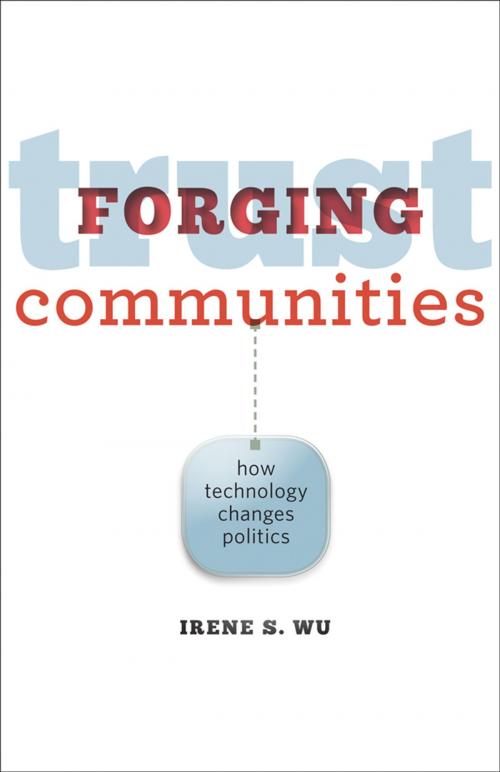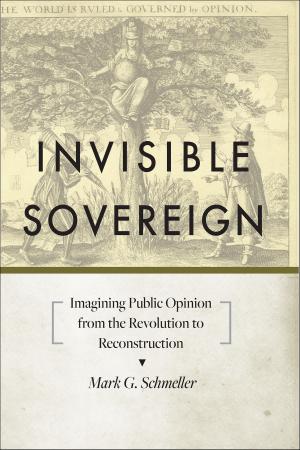Forging Trust Communities
How Technology Changes Politics
Nonfiction, Science & Nature, Technology, Social Aspects, Science, Social & Cultural Studies, Political Science| Author: | Irene S. Wu | ISBN: | 9781421417271 |
| Publisher: | Johns Hopkins University Press | Publication: | July 29, 2015 |
| Imprint: | Language: | English |
| Author: | Irene S. Wu |
| ISBN: | 9781421417271 |
| Publisher: | Johns Hopkins University Press |
| Publication: | July 29, 2015 |
| Imprint: | |
| Language: | English |
Bloggers in India used social media and wikis to broadcast news and bring humanitarian aid to tsunami victims in South Asia. Terrorist groups like ISIS pour out messages and recruit new members on websites. The Internet is the new public square, bringing to politics a platform on which to create community at both the grassroots and bureaucratic level. Drawing on historical and contemporary case studies from more than ten countries, Irene S. Wu’s Forging Trust Communities argues that the Internet, and the technologies that predate it, catalyze political change by creating new opportunities for cooperation. The Internet does not simply enable faster and easier communication, but makes it possible for people around the world to interact closely, reciprocate favors, and build trust. The information and ideas exchanged by members of these cooperative communities become key sources of political power akin to military might and economic strength.
Wu illustrates the rich world history of citizens and leaders exercising political power through communications technology. People in nineteenth-century China, for example, used the telegraph and newspapers to mobilize against the emperor. In 1970, Taiwanese cable television gave voice to a political opposition demanding democracy. Both Qatar (in the 1990s) and Great Britain (in the 1930s) relied on public broadcasters to enhance their influence abroad. Additional case studies from Brazil, Egypt, the United States, Russia, India, the Philippines, and Tunisia reveal how various technologies function to create new political energy, enabling activists to challenge institutions while allowing governments to increase their power at home and abroad.
Forging Trust Communities demonstrates that the way people receive and share information through network communities reveals as much about their political identity as their socioeconomic class, ethnicity, or religion. Scholars and students in political science, public administration, international studies, sociology, and the history of science and technology will find this to be an insightful and indispensable work.
Bloggers in India used social media and wikis to broadcast news and bring humanitarian aid to tsunami victims in South Asia. Terrorist groups like ISIS pour out messages and recruit new members on websites. The Internet is the new public square, bringing to politics a platform on which to create community at both the grassroots and bureaucratic level. Drawing on historical and contemporary case studies from more than ten countries, Irene S. Wu’s Forging Trust Communities argues that the Internet, and the technologies that predate it, catalyze political change by creating new opportunities for cooperation. The Internet does not simply enable faster and easier communication, but makes it possible for people around the world to interact closely, reciprocate favors, and build trust. The information and ideas exchanged by members of these cooperative communities become key sources of political power akin to military might and economic strength.
Wu illustrates the rich world history of citizens and leaders exercising political power through communications technology. People in nineteenth-century China, for example, used the telegraph and newspapers to mobilize against the emperor. In 1970, Taiwanese cable television gave voice to a political opposition demanding democracy. Both Qatar (in the 1990s) and Great Britain (in the 1930s) relied on public broadcasters to enhance their influence abroad. Additional case studies from Brazil, Egypt, the United States, Russia, India, the Philippines, and Tunisia reveal how various technologies function to create new political energy, enabling activists to challenge institutions while allowing governments to increase their power at home and abroad.
Forging Trust Communities demonstrates that the way people receive and share information through network communities reveals as much about their political identity as their socioeconomic class, ethnicity, or religion. Scholars and students in political science, public administration, international studies, sociology, and the history of science and technology will find this to be an insightful and indispensable work.















